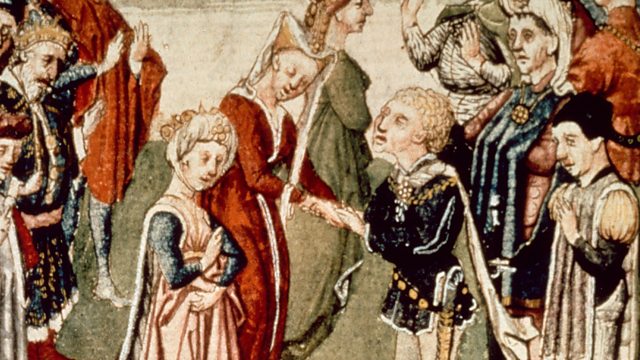The Nibelungenlied
Melvyn Bragg and guests discuss the epic German poem of Siegfried and Kriemhild against Gunther and Brunhilda, two powerful couples whose friendship turns to rivalry and revenge.
Melvyn Bragg and guests discuss The Song of the Nibelungs, a twelfth century German epic, full of blood, violence, fantasy and bleakness. It is a foundational work of medieval literature, drawing on the myths of Scandinavia and central Europe. The poem tells of two couples, Siegfried and Kriemhild and Gunther and Brunhilda, whose lives are destroyed by lies and revenge. It was extremely popular in its time, sometimes rewritten with happier endings, and was rediscovered by German Romantics and has since been drawn from selectively by Wagner, Fritz Lang and, infamously, the Nazis looking to support ideas on German heritage.
The image above is of Siegfried seeing Kriemhild for the first time, a miniature from the Hundeshagenschen Code manuscript dating from 15th Century.
With
Sarah Bowden
Reader in German and Medieval Studies at King’s College London
Mark Chinca
Professor of Medieval German and Comparative Literature at the University of Cambridge
And
Bettina Bildhauer
Professor of Modern Languages at the University of St Andrews
Producer: Simon Tillotson
Last on
More episodes
LINKS AND FURTHER READING
READING LIST
Bettina Bildhauer, Medieval Things: Agency, Materiality, and Narratives of Objects in Medieval German Literature and Beyond (Ohio State University Press, 2020)
Cyril Edwards (trans.), The Nibelungenlied: The Lay of the Nibelungs (Oxford University Press, 2010)
Jerold C. Frakes, Brides and Doom: Gender, Property and Power in Medieval German Women’s Epic (University of Pennsylvania Press, 1994)
Jan-Dirk Müller (trans. William T. Whobrey), Rules for the Endgame: The World of the Nibelungenlied (Johns Hopkins University Press, 2008)
Sara S. Poor and Jana K. Schulman (ed.), Women and the Medieval Epic: Gender, Genre, and the Limits of Epic Masculinity (Palgrave Macmillan, 2007)
Sara S. Poor, Alison L. Beringer, and Olga V. Trokhimenko (eds.), Gender Bonds, Gender Binds: Women, Men, Family in Middle High German Literature (De Gruyter, 2021), especially ‘Why Siegfried Has to Die: Gender, Violence, and the Social Order in the Nibelungenlied’ by Mary Marshall Campbell
Shelley Puhak, The Dark Queens: A Gripping Tale of Power, Ambition and Murdeous Rivalry in Early Medieval France (Head of Zeus, 2022)
Roland Scheel (ed.), Narrating Law and Laws of Narration in Medieval Scandinavia (De Gruyter, 2020), especially ‘Feudal Law and Archaic Order: The Discussion of Different Social Systems in the Queens’ Dispute in the Nibelungenlied’ by Heike Sahm
Ursula Schulze (ed.) and Siegfried Grosse (trans.), Das Nibelungenlied: Mittelhochdeutsch, Neuhochdeutsch (Reclam, 2011)
Alexandra Sterling-Hellenbrand, Medieval Literature on Display: Heritage and Culture in Modern Germany (Bloomsbury, 2020)
RELATED LINKS
Broadcasts
- Thu 1 Dec 2022 09:00������̳ Radio 4
- Thu 1 Dec 2022 21:30������̳ Radio 4
Featured in...
![]()
Medieval—In Our Time
Browse the Medieval era within the In Our Time archive.
![]()
Culture—In Our Time
Popular culture, poetry, music and visual arts and the roles they play in our society.
In Our Time podcasts
Download programmes from the huge In Our Time archive.
The In Our Time Listeners' Top 10
If you’re new to In Our Time, this is a good place to start.
Arts and Ideas podcast
Download the best of Radio 3's Free Thinking programme.
Podcast
-
![]()
In Our Time
Melvyn Bragg and guests discuss the ideas, people and events that have shaped our world.



